Armenians, Injustice, and Solidarity
It was not a month ago that many Armenians in the United States, Armenia, the United Kingdom, and elsewhere were proclaiming the need for Armenians to become exponents of Black Lives Matter, a misleading exhortation since Black Lives Matter, a self-proclaimed leftist organization with goals like disrupting “the Western-prescribed nuclear family structure,” which has led the protests throughout the world, differs significantly from the simple assertion that black lives matter.
The horrific death of George Floyd, a convicted criminal and drug addict, became the impetus for many Armenians the world over to pronounce the cause of black justice. Numerous paeans to solidarity with blacks were produced in an amazingly short amount of time, emotional appeals resounded from social media, and scathing reproaches against Armenians who chose to not participate – or, audaciously, to disagree. An Armenians for Black Lives letter was translated into Armenian, a website was set up to record all the work Armenians are doing as part of the Black Lives Matter movement, and numerous panels were organized to discuss claims of injustice against blacks.
A few short weeks after Floyd’s death, Azerbaijan launched a relatively large-scale attack on Armenia, beyond the usual sniper fire on soldiers and villagers that takes place throughout the year. Six soldiers were killed, all young men; one of them left behind a wife pregnant with their first child. They died defending Armenia.
How many letters were penned? How many panels were organized to discuss the cause and significance of their deaths? How many rhapsodic pronouncements were recorded and shared? How many posters were made to memorialize their faces?
More to the point: who knows their names?
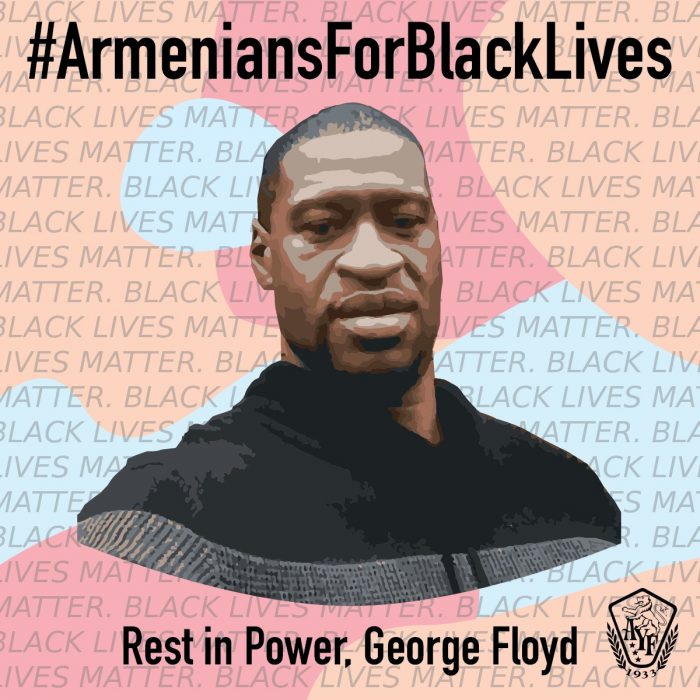
Others’ Causes
Armenians are frequently called upon to support others’ causes, despite having such limited resources that they have difficulty managing their own affairs, like operating community schools or prolifically creating sustainable, long-term projects in Armenia.
While it is understandable that the citizen of any country might want to participate in the affairs of that country’s political, social, economic, and cultural machinations, some explanation is required as to why the argument is made that Armenians must champion these causes because they’re Armenians.
In a piece in the Armenian Mirror-Spectator advocating for Armenian support of Black Lives Matter, Anaïs DerSimonian argues that, “The black struggle in America, like the Armenian struggle in the Ottoman Empire, is not a niche issue — it’s a human rights issue. As the survivors of the Armenian Genocide, we have a responsibility to uphold human rights, regardless of who that human is.”
Writing in Asbarez,, Razmig Sarkissian and Alik Ourfalian argue that Armenians should support Black Lives Matter because “…we know that pain. We should know that pain. Our ancestors felt that pain. We should empathize with that pain.”
Does such a moral imperative exist?
Frankly, no.
Suffering injustice is not a choice and, thus, to say that because one experienced a misfortune involuntarily that he should be required or morally bound to support others who are suffering injustice is untenable. Of course, a moral imperative might be claimed on different grounds but that is not generally the case.
Moreover, Armenians are called upon to “reject injustice” with the injustice being presupposed and without any substantive discussion as to what the alleged injustice is. While the systemic racism against Armenians in the Ottoman Empire or modern-day Azerbaijan are often juxtaposed with claims of systemic injustice against blacks in the United States, it is simply not comparable. There has never been nor will there be in the foreseeable future a Turkish or Azerbaijani president, supreme court justice, or high-level minister of Armenian origin. Nor are there, or will be in the foreseeable future, Turkish- or Azerbaijani-Armenian billionaires, media moguls, academics, TV channels, or popular subcultures. There is no museum of Armenian history in Turkey or Azerbaijan, streets and buildings and schools aren’t named after Krikor Zohrab, Zabel Yesayan, or Khrimian Hayrig in these places. The dissimilarities here are black and white.
Solidarity and its Discontents
The presumed moral imperative is the basis for calls to solidarity with the oppressed group of the moment, which is premised on the idea of intersectionality, at its core a rendition of Marx’s call for the world’s oppressed workers to unite. It is appealing to some Armenians because they hope that in helping others, they will themselves be helped when the time comes, which it never does.
Problematically, however, solidarity based on shared experiences of injustice frequently and inexplicably leads Armenian concerns and even Armenians themselves to be subordinated to the greater cause. For example, Arpi Movsesian, writing in the Armenian Weekly, considers Glendale Armenians an especially pernicious group, referring to them as living in a “bubble.” In writing about Armenians’ success, she notes that, “We Armenians should not only credit our hard work and determination in being largely middle-class…but also our privileged position in today’s America.”
The befuddling insinuation Movsesian makes is that as white people, Armenians, who 100 years ago were literally exterminated from their homeland where they lived for millennia and who reestablished themselves starting from nothing in communities around the world, subsequently becoming one of the world’s most successful diasporas, have white privilege to thank for our success and well-being.
To summarize the argument, we are schizophrenically called to support Black Lives Matter because we have suffered injustice ourselves but we must accept the doctrine of “white privilege,” which implies we occupy a privileged status that has allowed us to avoid injustice relative to that which blacks have suffered.
The question of solidarity often goes into ludicrous territory such as Armenian advocacy for Kurdish issues. Kurds, a group with over 30 million members worldwide, were not only active and willing participants in massacring and exploiting Armenians prior to and during the Genocide but continue to enjoy the benefits of the culture and industry of Armenians who lived on the lands they stole a century ago. The trite arguments about Kurds saving Armenians, us “taking the high road,” or Kurdish mea culpas are unconvincing when Kurds continue to live in Armenian homes.
This subordination of any self-respect as Armenians in order to show our solidarity was nowhere on more vivid display during the Black Lives Matter movement than in Denver, Colorado, where an Armenian khachkar, the most distinct symbol of Armenian culture and the superlative objectification of Armenians’ Christian heritage, was defaced not once but twice.
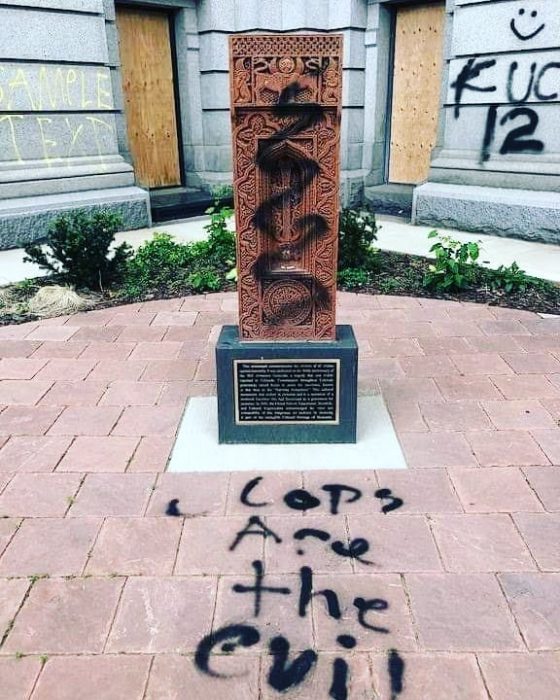
Surprisingly, many Armenians dismissed other Armenians for criticizing the vandalism. In one particularly acerbic reproach, one of the co-authors of the Armenian Academics for Black Lives letter, Natalie Kamajian, wrote a long public post upbraiding Armenians who criticized the desecration. The text, in full:
Armenians,
Please stop posting about the khachkar in Denver. Yes we get it, it was vandalized. Yes, it’s very unfortunate but… it’s an inanimate object. we also don’t know who did it and the anti-black racism I’m seeing on comments is literally making me sick. Do you know who’s stolen land that khachkar was erected on? Native peoples. The same stolen land you live and work on and reap benefits from with your white passing privilege
News flash: if you are going sit on STOLEN native land and cry about property that can be replaced while there is a slow state-sanctioned genocide of black people, whose lives cannot be replaced, happening before your very eyes and you STILL have the audacity to talk about reparations from Turkey…
YOU. ARE. A. HYPOCRITE.
consider this a sacrifice for the cause. and don’t think i don’t care about our sacred stonework:
1) im jughaetsi so if anyone is going to care about this khachkar it’s me; and
2) it’s a replica and it was obviously not a targeted attack against armenians because the entire state capitol building was vandalized. for real y’all most people still don’t know who we are or anything about our history (and yeah, that’s still on us).let’s not be racist and actually try to be allies here. let’s do better. for all of you who share the #armeniansforblacklives sentiment, will you put that into practice? head to these armenian pages on Facebook and call out racist folks in the comments. ՀԵՐԻՔԱ
Source: Facebook
While Kamajian is sickened by the comments about the defacing of the khachkar, not only is she apparently not sickened by the actual vandalism of a holy object, she reprimands those who are and then impels readers to consider the desecration of Armenian culture as a “sacrifice” for “the cause.”
If being castigated for thinking it wrong that one’s cultural monument was vilely defaced weren’t enough, Kamajian then claims there is a “slow state-sanctioned genocide of black people.” Putting aside the absolute falsity of claiming that black Americans are subject to genocide when their population has quadrupled in the past 100 years and their culture is freely and widely celebrated in America and, indeed, the world over, the readiness to disrespect the memory of Armenians who did experience a genocide during which they were violently massacred and dispossesed of their lives and property in advocating for solidarity with black Americans is extraordinary.
What About Armenians?
In addition to the July 2020 attacks on Armenia by Azerbaijan and the consequent deaths that resulted, 92 Armenian soldiers were killed in April 2016 when Azerbaijan again attacked Armenia. With the economic suffocation brought about through closed borders, shelling and shooting Armenian villages, threats against civilian flights, denial of history, destruction of culture, and allusions to completing the Genocide,Armenia and Armenians have their hands full with addressing injustice. This is to say nothing of the many – and more numerous – issues that are not related to injustice.
While having our hands full never seems to prevent Diasporan Armenians from making appeals to Armenians to support another cause, these perennial attacks and threats against Armenians never seem to elicit the same sustained and widespread paroxysmal indignation afforded to other causes. Why? Where are the academy-wide letters, the websites documenting Turkish and Azerbaijani aggression and violence, and the panel discussions on Azerbaijani anti-Armenian hate education?
Also striking is the total absence of substantive action on the part of communities with which Armenian groups have expressed solidarity. We are, after all, supposed to be “in this together.” But the case of black Americans is especially poignant given the recency of the Black Lives Matter movement, Armenians’ energetic solidarity, and the silence from the black community when Armenians were under attack.
If Armenians are expected to speak out for issues of concern to the black community – or any community – it should only be reasonable to expect that blacks will speak out on issues of concern to the Armenians that so devoutly support them in their time of need.
So why don’t they?
Black Americans, numbering about 40 million people, despite assertions of racial injustice, have ascended the highest offices of the United States. Yet, they have failed to address issues of pressing concern to the Armenian community, even when they have promised to do so.
Although a handful of so-called allies provide lip service to Armenians in different forums, the fact is that a black president (Barack Obama), a black attorney general (Eric Holder), two black secretaries of state (Condoleezza Rice and Colin Powell), a black national security advisor (Susan Rice), and many other high-ranking black officials didn’t seem to care much about either Armenian-American issues or issues with Armenia when they had an opportunity to act.
Indeed, it was President Barack Obama, perhaps the most powerful exponent of intersectional politics ever, who, despite widespread and exultant support from the Armenian community in the United States, declined for eight years to properly recognize the Armenian Genocide, who tried to act as a handmaiden of Armenian-Turkish reconciliation without proper acknowledgement of that genocide, who failed to condemn egregious violence against Armenians by Azerbaijan, and who proposed record cuts in aid to Armenia.
In a more recent case, Ilhan Omar, a black Congresswoman from Minnesota and another outspoken champion of intersectionality, had the opportunity to speak up about the Armenian Genocide and not only didn’t, she repeated a line straight out of the Turkish government’s playbook.
The fact is, blacks have been in positions of power and able to help Armenians in their own cause repeatedly – but they haven’t. And this isn’t limited to the black community: the absence of reciprocal solidarity is present in all relationships where Armenians believe that through their investments of time, money, and goodwill, they will build coalitions that will produce meaningful returns. They do not – and will not.
That’s not to say that the thousands of Armenian man-hours expended on other causes does not elicit some token reaction from the personal friends of the Armenians involved in such projects and the odd organizational condemnation. But, to use the parlance of the activists, these are wholly “performative” actions that have no inherent value, not unlike the quadrennial exercise by US presidential candidates condemning the Armenian Genocide as a nod to Armenian concerns without an actual investment in substantively addressing the issue.
Quid Pro Quo
The lack of interest among black Americans and others for Armenian issues exposes the idea of solidarity against injustice for what it is: a lie. There is no more fundamental understanding in politics than that it operates on the basis of quid pro quibus. That is why I do not fault the members of other groups for not acting in my interest – I do not expect them to.
Each group is responsible for its own well-being and Armenians must understand that they – and they only – are responsible as a group for Armenian affairs. They should likewise not call upon or expect Armenians, as a group, to participate and expend time, energy, and money in the causes of others when Armenians have no reasonable expectation to gain anything from it.
In fact, blind solidarity is a recipe for disaster because it is inherently superficial and, thus, insincere because it establishes a physically unsustainable principle where solidarity through action is distributed not only to those who have something to offer but indiscriminately to those who make a claim. Whose cause is worthy? Why is one cause more worthy than the next? Who decides? How many causes must one support? Why should I advocate for black Americans but not Hispanics? Why Hispanics and not poverty-ridden white Appalachians? Would it be possible to advocate for all oppressed groups or those claiming injustice with sincerity, while attending to one’s own group and their own issues? Certainly not, and this is evident.
This does not mean that Armenian individuals cannot or should not participate and contribute to whatever causes they deem worthy – that is their prerogative as free individuals. But no Armenian should call upon Armenians, as a group, to invest themselves in some cause unrelated to them as a group nor should they try to shame Armenians into doing so.
Armenians have enough concerns, in Armenia and in the Diaspora, to last many lifetimes. We have limited financial and human resources and we are not at a juncture in our history where we can afford distracting journeys on the bandwagon du jour in the hope that it is going to garner us that most ephemeral of rewards, goodwill.
Sarkissian and Ourfalian ask, “How can we demand justice for inhumane crimes committed against our people if we won’t do the same for another persecuted minority, for injustice happening before our eyes in the very country we live in?”
The simple answer: just like everyone else does.
This is dedicated to Smbat Gabrielyan, Grisha Matevosyan, Sos Elbakyan, Garoush Hambartsumyan, Ashot Mikayelyan, Artur Muradyan, soldiers of the Armenian Armed Forces killed in action while defending Armenia.
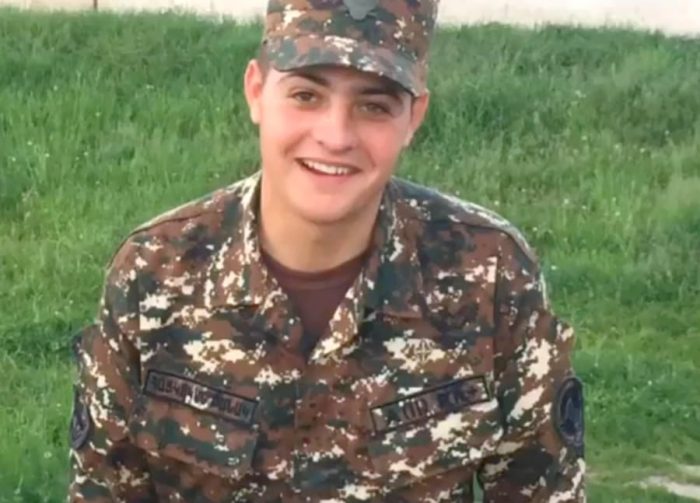
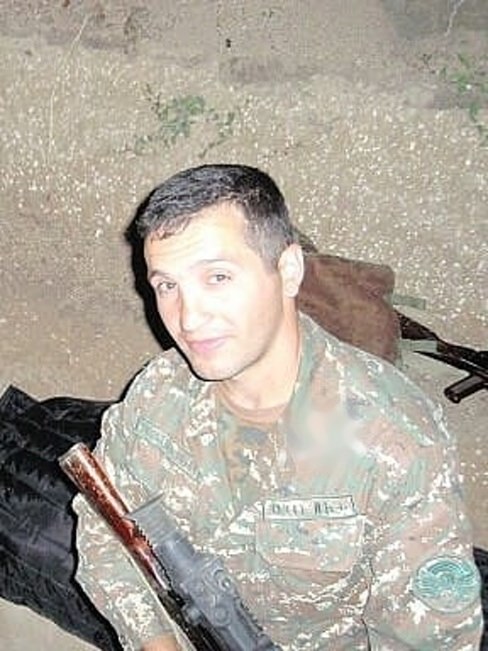
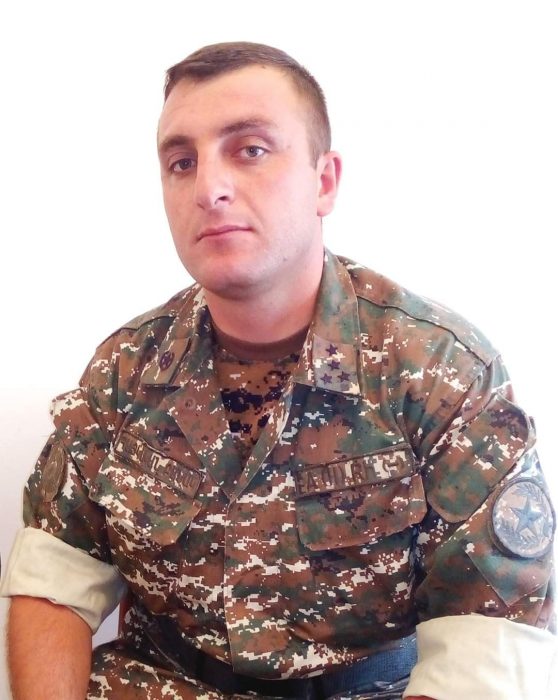
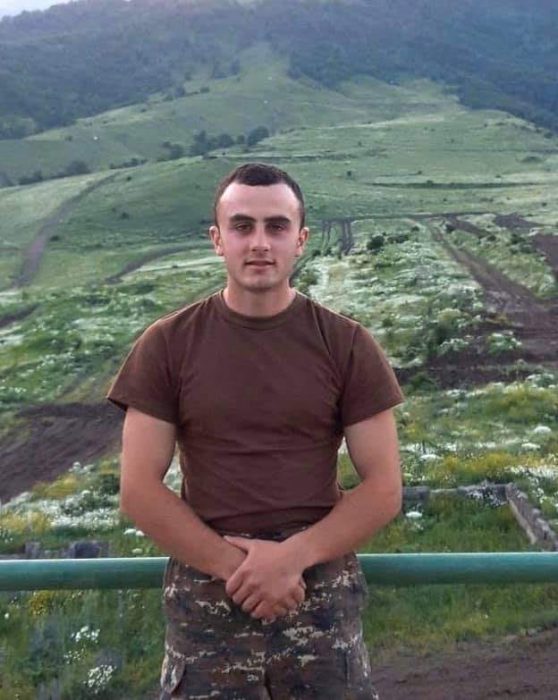
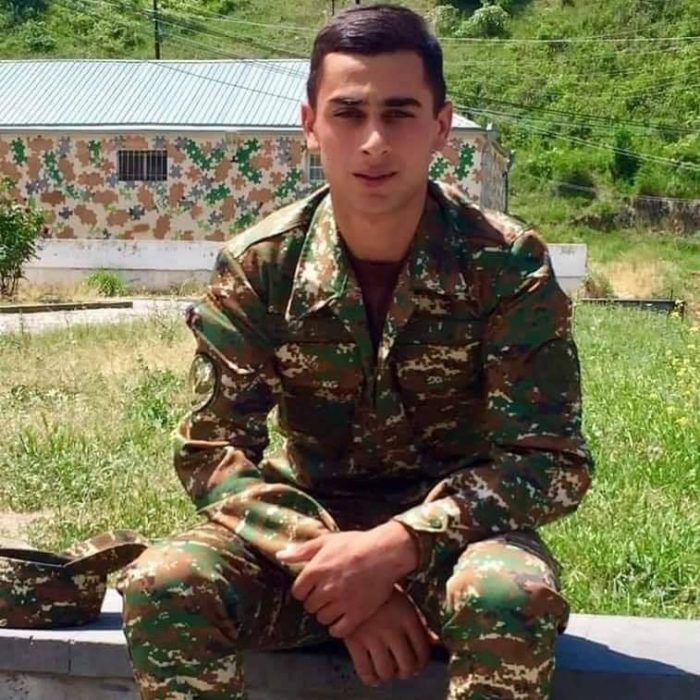
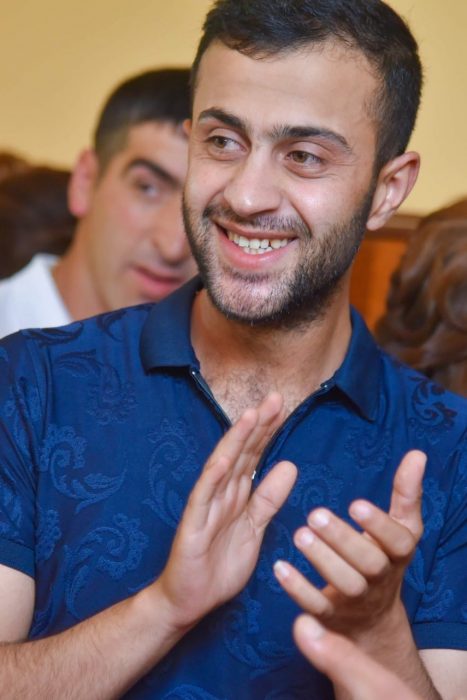

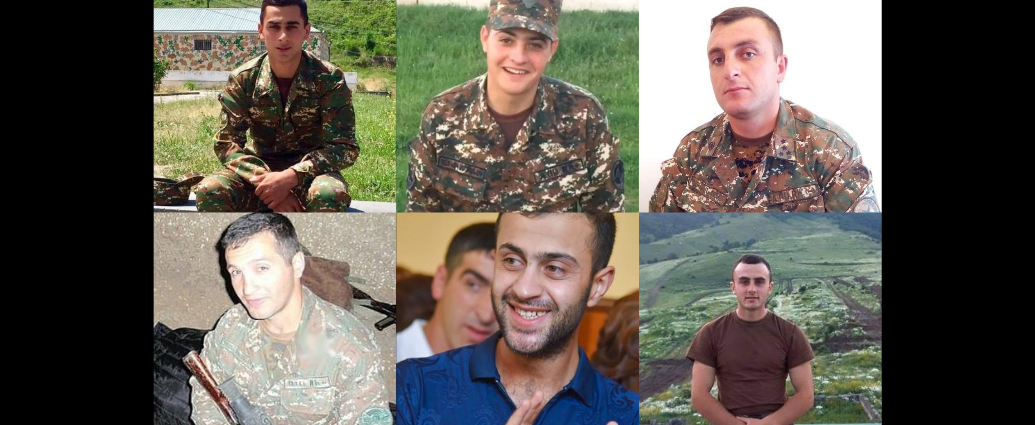
Bravo William!
Armenians are ready to fight wars for all kinds of peoples, except theirs. It’s encouraging to see that there still are sensible Armenians like you in this world…
Thank you for your kind comments. I’m always encouraged to learn that there are more of us than it seems.
Hallelujah; Amen.
Thank you.
Actually, a lot of statements and calls were made, and a lot of panels organized around what is going on in Armenia and Artsakh. In fact, it was even integrated into at least one event I watched on BLM and Armenians. Oversimplifying is a problem. Also, if you are so against supporting BLM then refrain from coopting the phrase for your “Armenian Lives Matter” please. Come up with something new. It looks very click-baity as things stand.
Shockingly, it seems Armenians are actually capable of both advocating for justice in their own communities AND for Armenians at the same time! Who would have thought?! This article’s attempt to practically blame the deaths of Armenian soldiers on the front line because a couple activists in the diaspora were too busy writing op-eds is a horror show of bad takes. Also the shameful way he seems to discount any organic desire Armenian-Americans might have for racial justice in their country, as if to say “well Obama didn’t recognize the genocide so why should you care about George Floyd or systematic racism and disenfranchisement of Blacks?” Who is he to tell individual Armenian-Americans what they can and can’t advocate for?!
I think the article was more about the Armenians who were blaming the silent majority for not marching in the streets with their BLM flags, a point I’m sure you Purposely missed Considering your words sound hauntingly similar to those “woke” armos.
It does not sound like this article was about Armenians “blaming the silent majority for not marching in the streets with BLM flags” given that the article actually points out the events and petitions and statements made by Armenians seeking to express solidarity with those fighting for justice for Black Americans. So it underlines the activity around the issue (and conveniently leaves out the significant activity around the Armenia-Artsakh issue).
What I wonder is why the author and others are using the Armenia-Artsakh issue as a shield to hide behind as they express why they are against supporting BLM. That is what is really happening here, and it’s unfair because it instrumentalizes the very serious and concerning issues in Armenia and Artsakh. Just write an article on why you are against supporting BLM but do not use the Armenia-Artsakh issue to create some sort of false “morally superior” stance. That is not right. Especially since you are surely aware that most Armenians who support BLM are extremely concerned about what is going on in Armenia and Artsakh, and are very vocal about it.
Perhaps you missed this part of the article: “This does not mean that Armenian individuals cannot or should not participate and contribute to whatever causes they deem worthy – that is their prerogative as free individuals.”
Please point me to the letter(s) penned by Armenian academics and circulated nationwide, the posters made memorializing the killed soldiers, or the website(s) created to bring attention to what was happening
Also, the question is not only about BLM, which is why I noted “Others’ Causes,” and not only the causes of black Americans. Armenian groups, over the years, have spent time, effort, and money on several non-Armenian causes and initiatives – time, effort, and money that could’ve been spent to strengthen the community in the Diaspora or Armenia itself but which were expended elsewhere.
Are you asking a reader to do the work you should have done before writing this piece? To post a list of links to the various events that have taken place (or will soon take place) on this topic? Are you genuinely unaware of these events, planned by organizations big and small, in the US, Europe, and beyond? And the statements posted online, by organizations big and small, related to the military offensive and to the growing list of hate crimes against Armenians? These are all easily visible on Facebook and Instagram. In fact, on Instagram, even seemingly “non-political” Armenian accounts are now rabidly raising awareness on this topic.
Either you chose to exclude the links to these events and statements as they would demolish the argument you’re making here, or you did not do enough research before writing this piece.
Perhaps YOU could collect all the links to the events and statements and consider how it would affect what you are arguing here. Perhaps you could integrate them into a rewrite of this piece.
In closing–as this will be my last comment here–it is touching that you are paying tribute to these fallen soldiers. It is important to remember that these are young lives taken all too soon. So thank you for that important gesture.
First, thank you for your kind words.
Otherwise, I’m not asking you or anyone to do my work – I’m asking you to show me proof of what you’re claiming when I haven’t seen any such proof in my own research. I’ve seen no letters circulated by Armenian academics about the Azerbaijani attacks on Armenia, nor have I seen posters produced by any organizations for the soldiers who were lost, while I’ve seen at leas two for George Floyd.
I know protests and rallies were organized – that’s not what I’m talking about. I know of one semi-academic Zoom conference about the fighting but nothing else.
Okay, since the omission seems honest (albeit surprising), I’ll post a few of the links here. They may be useful to other readers as well. In addition to petitions, protests, rallies, fundraising, legislation-passing, and awareness-raising efforts by Armenians all over the world, there have been (or soon will be) several events put on by organizations big and small:
https://www.facebook.com/ANCASF/videos/330671011290219/
https://www.facebook.com/agbuypla/photos/a.156575201065769/3283152868407971/?type=3&theater
https://www.facebook.com/Charjoum/videos/734056550702726/
https://www.youtube.com/watch?v=WJ9PRrow0ck&feature=share
https://armenianweekly.com/2020/07/29/scholars-journalists-focus-on-armenia-azerbaijan-clashes-during-naasr-panel/
https://www.youtube.com/watch?v=NXb-woNbdRA&feature=share
A small sampling of statements and articles I have come across:
http://asbarez.com/195845/u-s-house-intelligence-authorization-act-to-shine-spotlight-on-azerbaijani-aggression/
https://www.facebook.com/notes/zoravik/zoravik-statement-on-azerbaijans-military-offensive-against-armenia/3070428529706292/
https://www.facebook.com/notes/zoravik/our-response-to-azeri-hate-crimes-vandalism-and-attacks-on-peaceful-protestors/3090598651022613/
In addition, there is a ton of activity on Instagram, as I mentioned previously. Instagram has turned out to be an important site of awareness- and fundraising. Some of the sites I’ve seen trying to raise funds or educate non-Armenians on the Armenia-Artsakh issue are kooyrigs and lavashlife.
Regarding the letter circulated, first, it is these individuals’ prerogative–as you yourself say in the article–to express solidarity. Most of these academics probably do not even know each other–they’re individuals signing a petition crafted by another individual they don’t know. They probably simply agree with the general idea: solidarity with BLM. I don’t see the problem.
Second, we must keep in mind that the Armenia-Artsakh issue is very old, whereas Armenian activity around BLM is new (and BLM as a movement is also new). So it’s just not a solid or appropriate comparison. In fact, there are many, many more existing petitions, events, articles, websites, etc. on the Armenia-Artsakh issue than there are on BLM.
As for the posters and drawings, it would indeed be great if someone talented could make some of the fallen soldiers (or of the Tavush region). 🙂 I do think you’re exaggerating the “resources” expended on other groups and their struggles, though: the website you mention was surely easy (and free) to make, and the same goes for the posters and drawings. I don’t see the problem with individuals or organizations sharing them.
I do wish you would change the title of this piece, though. If this is not really about BLM, then there is no need to use the phrase to make the point… It might even weaken the point you’re trying to make.
Thank you for linking to these, though it’s not what I asked for. Like I said, I’m aware of the events and it’s great to put together talks for our own consumption – I’m sure there are many people who find them useful. However, while I’ve seen the tendency to reduce this article to “what did we do when Armenians were attacked?,” that was hardly the point. The issue is much larger and has many more layers. The absence of posters and signature campaigns, while they would be great to see, were used to illustrate a point, not to suggest that they would be anywhere near sufficient – they wouldn’t be. Indeed, that we’re even discussing whether doing these particular things are adequate are an indication of how low the bar is set.
Armenians – and the Diaspora in particular – have huge issues that they need to resolve and nobody – including the black Americans they’ve spent an incomparable amount of time supporting (which is their right) – is going to come to our aid. We can pretend like we have unlimited resources, which is what we often do, then act surprised when something happens that, if we were focused on strengthening ourselves preemptively, we wouldn’t have had to worry about or, at least, would’ve tempered considerably, like schools shutting down, Armenia’s economic development, or whatever else.
Do you know any contemporary writers of Armenian literature? Serious writers. Maybe we could come up with a few but our Diaspora is wealthier than ever yet our cultural production is in doldrums – what is going to sustain Armenian identity? Or are we planning on reading Abovyan, Oshagan, Tekeyan, and Shahnour indefinitely? Despite such a wealthy Diaspora, it’s been nearly impossible to get substantive, long-term investment into the one homeland we have. I’m familiar with the arguments and they’re all unconvincing. Why do we pretend like working on these complex, multi-layered, long-term issues doesn’t require all the brainpower and manpower we can muster in our worldwide community? A popular retort to this piece (though, again, addressing only one of the points) has been that we can do what we need to do and do everything else. That’s a delusion and anybody who has spent any time seriously thinking about these and other concerns that our people face would realize that not only would we be unable to address all these issues and all the other issues we choose to adopt, but even if we dedicated all our time, energy, money, and human resources to these problems, it would still take us decades just to catch up.
I just posted a long list of links to events, statements, and more. The comment has disappeared–or is it awaiting moderation even though it seemed to have been published?
Posts with several hyperlinks are automatically flagged and held for moderation because the system thinks they’re spam. All your comments (except duplicates) have been approved and should appear publicly. Please let us know if there are any problems. Thanks.
I guess I’ll rewrite some of it here, and save a copy for myself this time.
Here are some of the events that have recently taken place or will take place soon. They are put on by organizations big and small:
https://www.facebook.com/ancagrassroots/videos/331943734496280/ (viewed over 14K times in under a few days)
https://www.youtube.com/watch?v=NXb-woNbdRA&feature=share
https://armenianweekly.com/2020/07/29/scholars-journalists-focus-on-armenia-azerbaijan-clashes-during-naasr-panel/
https://www.youtube.com/watch?v=WJ9PRrow0ck&feature=share
https://www.facebook.com/agbuypla/photos/a.156575201065769/3283152868407971/?type=3&theater
https://www.facebook.com/Charjoum/videos/1010715666027423/
And here is a small sampling of statements and other awareness-raising activities:
http://asbarez.com/195845/u-s-house-intelligence-authorization-act-to-shine-spotlight-on-azerbaijani-aggression/
https://www.facebook.com/notes/zoravik/zoravik-statement-on-azerbaijans-military-offensive-against-armenia/3070428529706292/
https://www.facebook.com/notes/zoravik/our-response-to-azeri-hate-crimes-vandalism-and-attacks-on-peaceful-protestors/3090598651022613/
http://asbarez.com/195845/u-s-house-intelligence-authorization-act-to-shine-spotlight-on-azerbaijani-aggression/
In addition, Instagram accounts including kooyrigs and lavash life have been doing fundraising and awareness-raising (including educating non- Armenians on these topics).
In sum, Armenians around the world have been extremely active in awareness- and fundraising, legislation-passing, protests, rallies, events, and more. So the statement that they have not is simply false.
Regarding the activity around BLM (a recent phenomenon, unlike the the Armenia-Artsakh issue), the examples you gave–the website, the petition, and drawings–are all the work of a few individuals acting on their own prerogative. Incidentally, they cost zero dollars to make, share, or sign.
Finally, please consider renaming this piece. Coopting the BLM phrase weakens the points you are seeking to make here, as it sets up a false opposition.
Please don’t delete this comment. My previous comment included more resources than this one. Isn’t that what this article is ultimately calling for? Thank you.
Well put. Too many Armenians, particularly in the US diaspora, like to virtue signal. When it comes to doing something to improve Armenia they are no where to be seen. What a shame!
Thank you.
William, as usual, a highly skeptical but nonetheless thought-provoking piece. I am left hoping that it will never be true that “each group is responsible for its own well-being.” If it were true, the alienation from each other could grow so deep that it would excuse us all from speaking up against evil against an “other.”
Indeed, Shari, that might be where we end up, if we haven’t already. The fact (I don’t use this term lightly and would encourage anyone to prove to me otherwise) is that Armenians fighting vociferously for others has frequently been a one-way street. I don’t like it and, of course, wish it weren’t that way, but the world isn’t composed of my wishes.
If we continue to insist on fighting for others’ causes in the hope they’ll one day fight for ours, our best bet is to make our solidarity worth having by focusing our limited resources on ourselves first before doling them out to others.
Maybe, William, yet wishing and hoping can put things in motion.
I am not an expert but would refer to one example that I am familiar with, the No Place for Denial campaign in Massachusetts a little over a decade ago. Jewish-American and human rights communities and individuals came out to support efforts to recognize the Armenian Genocide and condemn Genocide denial efforts. Perhaps more importantly, we are also individuals. And, if we assign people only to their ethic identities, we miss the uniques of the individual experience. People are not only part of the communities or groups to which they might belong.
At this same time, as a nation we should collectively dedicate more effort on our development.
If Black lives mattered to Blacks, Blacks would not be shooting and killing other Blacks in such large numbers, such as in Chicago and just about every other large, Democratic- run city.
And Blacks would not be burning and looting Black-owned businesses, thereby hurting their own community.
I do not want the Armenian American community to be brainwashed by the Left.
Thank you, William. Your article is a breath of fresh air in an environment polluted by Antifa.
While I have thoughts on the nature of BLM and the issues within the black community that influence it, I wanted this article to focus on our role as a community within their movement and not on the validity of the movement itself. I hope this article was helpful in doing that. Thank you for reading.
As we say in Armenian (pernit talar), it was about time for somebody to say something about this, I am not in politics or so, but my heart was in pain everytime I see a picture of our youth everywhere in the world and unbelievably in Armenia and in front of the fire of the genocide memorial with the sign on their neck that BLM. What’s going on with our youth, who is poisoning the minds?.
Anyway, thank you again for this article, I will share it, I know some of friends on my circle will unfriend me , but I care more about our case than loosing friends that they don’t want to hear anything outside their knowledge.
First of all, comparative history and comparative genocide are huge fields. Armenians, especially Armenian-Americans, will often make the following argument: Why is the Holocaust almost universally accepted and uncontroversial, while the Armenian Genocide isn’t? They will say fundamentally they weren’t different, and they will compare the tactics of denial (Richard Hovannisian has done this brilliantly for merely one example), they will shame Israel for not recognizing the Armenian Genocide and say it has a moral obligation to do so, among other things. The comparative study of the Armenian Genocide and the Holocaust is actually rather prevalent in academia. There have been conferences on the Armenian Genocide and the Holocaust. There are annual international conferences on genocide where all sorts of genocide scholars interact and compare notes. There is a book by Deborah Mayersen comparing the Rwandan and Armenian Genocides. Probably the most “obvious” comparative work is on the contemporary Assyrian and Greek victims of genocide, who are among those peoples mentioned in the recent Armenian Genocide resolution. Today Nikol Pashinyan made a statement on the 2014 Yazidi genocide, after which Armenia took in some refugee families. As of 2019, Yazidi Armenians enjoy a lavish temple in Armenia. The ANCA consistently prides itself on making coalitions with other groups, whether ethnic, civil, or religious. April 24 includes Assyrian, Kurdish, and Greek groups expressing solidarity. I disagree with none of it and I think it’s only helpful. I don’t think it was a waste of time and resources. We will have to think a lot more about shared history and trauma in the quest to mend our historical wounds.
So this is not the first time Armenians are having these intergroup conversations, and Armenians will often apply similar logic in other contexts. Since the onset of the George Floyd protests, we are now opening a dialogue we haven’t had much before with another group, African-Americans. I don’t understand, you see no common threads of oppression between Armenians and African-Americans? Genocides perpetrated against African peoples by imperial powers, the slavery African Americans experienced until the 1860s, the open legal segregation of blacks from whites until 1965, and the perpetuation of institutionalized racism against African-Americans since, should be some starting points.
Imperial powers removing a substantial proportion of Africans from their homeland; tearing apart numerous families, villages, religions, and regions; erasing African culture (cultural genocide); inflicting mass death upon Africans; raping African women; breeding African slaves; etc. for centuries may not technically constitute a genocide, but I think you can see a few common threads between our historical experiences. You are treating the matter like African-Americans appeared in America ex nihilo.
Anyways, sure, there has very arguably been more progress in White-African American relations than Armenian-Turkish relations, though I will say there are a few influential/famous/wealthy Armenians in Turkey. That doesn’t mean the Armenian and African-American experiences are incomparable, especially considering the history I mentioned above.
I don’t understand how sticking to our Armenian bubble is particularly helpful. The people you criticize are rightly pushing against our single-mindedness. I totally disagree with your section on the khachkarer. The entire nation had its eyes on a black man wrongfully killed by the police, a pandemic was raging, and national unemployment was soaring, and all many of the Armenians I knew were talking about was the khachkar. Forget your accusations of schizophrenia, that behavior is complete detachment from reality. It is Armenian solipsism. We are too insular, so I’m happy for attempts at solidarity. We are a tiny minority in America. It is already very difficult to have our voice heard by others. I don’t think just talking about ourselves all the time and sticking to our basic causes is a wise strategy, particularly when you seek the attention of others. Because we are a tiny minority in America, it is obvious that 40 million Black Americans and 200 million white Americans are not going to pay us as much attention as we do them. It is simply a fact that we are going to have to work harder than other people to have our voice heard; Armenian solipsism isn’t going to make genocide recognition, aid for Artsakh, etc. any easier, and posting about BLM isn’t going to make it any harder.
It’s not like there were many resources exerted on Armenian-African-American solidarity before the George Floyd protest, so how can you retroactively cite President Obama and Condoleeza Rice? That’s not even the biggest problem. I could name African-Americans who have expressed solidarity with Armenians, like when Waka Flocka (3.3 million followers) posted an Instagram story on the Tavush attacks or when Tupac said “I guarantee we will have our own political parties. It won’t just be for blacks. It’s goin’ be for Mexicans, for Armenians, all you lost-tribe muthafuckas.” But I don’t think that’s really relevant; railing off names of prominent African-Americans at each other and lumping them all together as if they are of one mind and beliefs is particularly productive. I mean, what did Condoleeza Rice do for Black Americans as secretary of state, let alone Armenians? Just because she is black and powerful doesn’t mean she speaks for and leads Black America. I can just as easily name the numerous Black Congressmen who voted in favor of the Armenian Genocide resolution in both houses of Congress. But that’s not really the point, is it?
While recalling the intergroup relations I mentioned in the beginning, I want us to recall a little bit more history: the Near East Relief Fund’s work for Armenian Genocide victims, the fact that a few months ago we raised hundreds of thousands of dollars for millions of American meals in honor of the Near East Relief fund’s work, the Middle Eastern countries that gave us a home after the Genocide, the work we did building those countries in return, and the immense relief effort across the world for the 1988 Spitak earthquake. There is a definitely some history of reciprocity that is worth examining.
Anyways, I don’t think Armenians for Black Lives is going to revolutionize the Armenian Cause and get millions of otars on board. But I think we have opened dialogue on a new, interesting, and potentially fruitful front. It was great when Jews and Armenians were talking about their genocides and we had people like Elie Wiesel fighting openly for our cause. http://www.genocide-museum.am/eng/126.php (126 Holocaust scholars recognizing the Armenian Genocide). Why not try and open another bridge? Lord knows we need fresh dialogue and strategies in the diaspora.
The many Armenians who fight vocally for the recognition of the Armenian Genocide, purportedly for the purpose of justice for historical victims and their descendants, should definitely be thinking about and empathizing with other oppressed groups who have their own struggles. It’s the most logically consistent and morally correct position. How does it sound if in one breath I’m writing to my Congressman saying America has a moral imperative to recognize the Armenian Genocide, but in another breath I’m trying to argue there is no moral imperative for Armenian-Americans to talk about anything but our personal issues?
Just because it’s not possible to go to one extreme and “advocate for all oppressed groups or those claiming injustice with sincerity” doesn’t mean we should go to the solipsistic extreme of only thinking about ourselves and our issues. Armenians for BLM are not the first people to talk about how it is immoral to be neutral in situations of injustice.
On a quick note, many more Armenian “resources” have been dedicated to Tavush than BLM. What is the loss in talking about both? We can compare dollars raised for each by prominent diaspora Armenian organizations. I think there is no comparison. And they are not mutually exclusive.